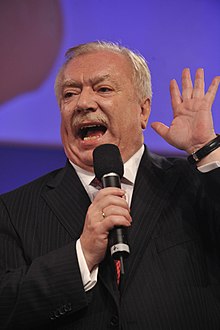State government and city senate Häupl II
| State government and city senate Häupl II | |
|---|---|

|
|
| Governor Mayor | Michael Häupl |
| choice | 1996 |
| Legislative period | 16. |
| Appointed by | Vienna City Council |
| education | November 27, 1996 |
| The End | April 27, 2001 |
| Duration | 4 years and 151 days |
| predecessor | State government and city senate Häupl I |
| successor | State government and city senate Häupl III |
| composition | |
| Party (s) | SPÖ and ÖVP |
| representation | |
| Vienna City Council and Parliament | 58/100 |
Provincial government and city senate Häupl II was the name for the second Viennese provincial government and the Vienna city senate under Mayor and Governor Michael Häupl between 1996 and 2001. The city government was sworn in after the state and municipal council elections in 1996 on November 27, 1996 and dissolved the provincial government Häupl I. from. After losing the absolute majority, Häupl formed a coalition government with the ÖVP. In the 14-member city senate and the state government, the SPÖ provided 7 members, the ÖVP 2. The 4 members of the FPÖ, who won the election, like the representative of the Greens, remained without a department.
During the government period, Rudolf Edlinger resigned from the state government after his appointment to the federal government, followed on January 31, 1997 by Brigitte Ederer as city councilor for finances, economic policy and Wiener Stadtwerke. After Ederer resigned her mandate on December 14, 2000 to switch to the private sector, the previous City Councilor for Health and Hospital Sepp Rieder took over the finance department. Rieder's health department changed to the new city councilor Elisabeth Pittermann , who was elected on December 14, 2000.
Choice of government
Michael Häupl was elected mayor with 65 votes from the SPÖ, ÖVP and Greens. Grete Laska received 62 votes in the election for Vice Mayor, Bernhard Görg received 64 votes. Renate Brauner, who stood against Bernhard Görg as Vice Mayor to strengthen the women's and integration department, had received 9 votes.
The distribution of votes in the election of the city councils was: Renate Brauner (70 votes), Rudolf Edlinger (65 votes), Margarete Laska (62 votes), Sepp Rieder (60 votes), Werner Faymann (65 votes), Friedrich Svihalek (63 votes) , Lothar Gintersdorfer (34 votes), Johann Herzog (33 votes), Karin Landauer (33 votes), Walter Prinz (32 votes), Bernhard Görg (60 votes), Peter Marboe (62 votes) and Friedrun Huemer (49 votes). Brigitte Ederer was elected in 1997 with 65 of 98 votes cast.
Government members
| Office | Surname | Political party | Distribution of responsibilities at the end of the government period |
|---|---|---|---|
|
Governor Mayor |
Michael Häupl | SPÖ | |
| 1. Deputy Governor 1. Deputy Mayor Executive City Councilor |
Margarete Laska | SPÖ | Youth, social affairs, information and sport |
| 2. Deputy Governor 2. Deputy Mayor Executive City Councilor |
Bernhard Görg | ÖVP | Planning and future |
| Executive city councilor | Renate Brauner | SPÖ | Integration, women's issues, consumer protection and personnel |
| Acting city council | Werner Faymann | SPÖ | Housing, housing and urban renewal |
| Executive city councilor | Elisabeth Pittermann | SPÖ | Health and hospital services |
| Acting city council | Sepp Rieder | SPÖ | Finance, economic policy and Wiener Stadtwerke |
| Acting city council | Friedrich Svihalek | SPÖ | Environment and traffic coordination |
| Acting city council | Peter Marboe | ÖVP | Culture |
| City council | Lothar Gintersdorfer | FPÖ | without department |
| City council | Johann Herzog | FPÖ | without department |
| City council | Karin Landauer | FPÖ | without department |
| City council | Walter Prince | FPÖ | without department |
| City council | Friedrun Huemer | Green | without department |
| Members of the state government who left prematurely | |||
| Executive city councilor | Brigitte Ederer | SPÖ | Finance, economic policy and Wiener Stadtwerke |
| Acting city council | Rudolf Edlinger | SPÖ | Finance, economic policy and Wiener Stadtwerke |